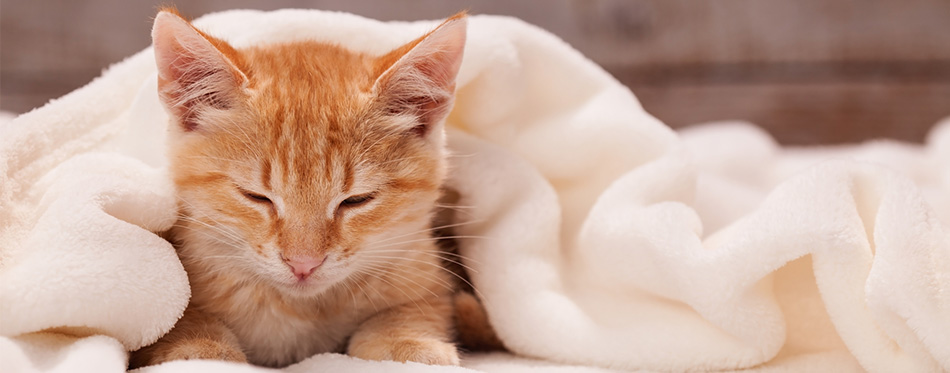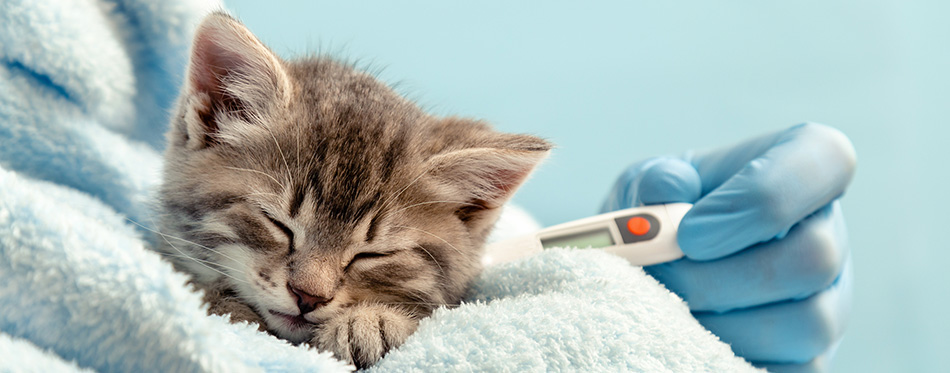We all know that a bout of the sniffles can bring you down, but have you ever thought about whether this common yet uncomfortable condition could afflict your beloved pets? Luckily, cats and humans are different enough that you won’t infect them with your winter cold, but viruses are a tricky bunch, and plenty of strains have evolved that can latch onto your feline friend.
If you’ve ever wondered how the common cold might affect your kitty, then read on, as we discuss what might put your cat at risk, how to treat a cold at home, and more. If in doubt about your cat’s medical condition, be sure to seek the help of a trusted veterinary professional as soon as possible.

Can Cats Catch Colds?
Simply put, yes: cats can catch a cold. The strains which cats are usually affected by are actually more closely related to flu than the common cold, and referred to as feline viral upper respiratory disease or, more simply, ‘cat flu’.
Cat flu is usually nothing to worry about, but certain cats may be more at risk of contracting the condition, and experiencing complications:
- Kittens
Younger cats are more at risk of developing cat flu because their immune system hasn’t had a chance to build up much resistance to the virus. If they do contract cat flu, their undeveloped bodies can also have a harder time fending off the invading pathogens.
- Senior Cats
When your cat gets a little older, many systems in the body begin to decline. Unfortunately, this tends to affect their immune system. Just like young kittens, older cats may be less able to fight off the flu, making them more likely to exhibit symptoms, and experience lengthy recovery times.
- Cats with certain Health Conditions
If your cat has been prescribed immunosuppressant drugs, or suffers from a health condition that compromises their immune system, they’re a little more likely to catch a cold. You can mitigate the risk by keeping immunocompromised cats indoors. Cats with lung conditions can also experience the symptoms of a cold more severely, since their lung function is already compromised, and colds can further block the airways with mucus.
How Do Cat Colds Spread?
Just like human colds, cat colds can be spread in a number of ways, which can vary depending on the strain. Most colds are transmitted through bodily fluids, for instance:
- Sneezes
- Saliva droplets
- Coughing
- Eye discharge
However, some healthy cats can also unknowingly carry the disease, and spread it to others. For this reason, spotting cat flu can be tricky, and it’s best to limit your pet’s exposure to other cats if they are very young, old, or unwell. Cat cold symptoms usually appear between a few days and a couple of weeks after the initial exposure.
Symptoms of Cat Colds
If your cat develops a cold, you can expect them to display the following symptoms:
- Sneezes
Humans and cats sneeze for exactly the same reason: this involuntary muscle reflex helps to dispel foreign bodies from the nasal cavity. When your cat has a cold, sneezing helps to remove trapped pathogens. Generally speaking, sneezing is the most prominent symptom of cat colds.
- A Runny Nose
The cold virus can irritate the nasal lining inside your cat’s nose, causing it to produce extra mucus in an effort to protect them. When too much of this mucus is produced, your cat can experience a runny nose. If you notice a little leakage around your cat’s nasal passage, they could be suffering from a cold.
- Eye Discharge
Also known as conjunctivitis, excess eye mucus is another common sign that your kitty has a cold. This symptom usually appears later on in the illness, and is triggered when the eyes attempt to dispel invading virus particles.
- Breathing through the Mouth
Cats breathe through their nose most of the time, but when these passages become swollen or blocked, you may notice that they breath through the mouth instead. This typically results in louder breathing.
- Reduced Energy Levels
Fighting off a cold is hard work. When your cat’s body channels all of its energy towards recovering from a virus, you can expect them to be a little more lethargic than usual. If your cat is suffering from a cold, they will usually take more time to rest, and may be uninsterested in their usual playtime activities.
- Fever
Just like us humans, cats can run a temperature when they catch a cold. This is because the enzymes needed to fight off infection function better at a higher temperature, triggering the body to heat up. When healthy, your cat should have a temperature between 100 and 102 degrees Fahrenheit. Any temperature above 103.5 degrees Fahrenheit can be considered a fever.
- Loss of Appetite
Many cats just don’t feel like eating when they’re ill – blocked nasal passages certainly don’t help. If you notice that your feline friend isn’t eating as much as usual, this could be a sign that they have a cold.
- Coughing
If the cold has spread to your cat’s lungs, you can expect to see some coughing. The act of coughing helps to remove excess mucus from the lungs, in which virus particles are trapped.
If your cat develops one of more of these symptoms, they may well be suffering from a cold.

When to Visit Your Vet
Most healthy cats can catch the occasional cold and recover on their own. However, it’s a good idea to speak to your vet as soon as possible if their cold-like symptoms are accompanied by one or more of the following:
- A Long Recovery Time
Most cat colds should pass within a week to 10 days. If your cat remains ill after this period, or shows no improvement over a few days, take them to the vet.
- Labored Breathing
If your cat is struggling to breathe, it’s time to speak to your vet. Look out for prominent chest movement and wheezing. Difficulty breathing could be the sign of something more serious than a cold, and could require prescription medication.
- Thick, Dark Mucus
It’s normal for your cat to produce cream or yellow mucus from their nose and mouth over the course of a cold. However, if this mucus becomes dark green or brown, it’s time to see a vet. Very dark mucus could indicate a secondary infection that requires antibiotics to treat.
- Low Food Intake or Dehydration
When cats refuse to eat, they can damage their liver pretty fast, so it’s important to seek veterinary assistance if their appetite drops away completely. Equally, dehydration can trigger a whole host of problems, so it’s a good idea to see a vet if your cat isn’t drinking. Signs of dehydration include dry gums, lethargy, and loss of skin elasticity.
Home Remedies
Cat colds are caused by a virus, which can’t be treated by antibiotics. However, you can help to ease your cat’s symptoms by employing some simple home remedies.
- Use a Vaporizer
Having a cold can be a dry and irritating experience, and adding moisture to the air can make things a little more comfortable. Humid air helps to keep your cat’s breathing passages moist, making it easier for them to expel mucus. For more options, check out our detailed review of air purifiers for pets.
- Keep things Cozy
Many of us like nothing more than a day in bed when we’re recovering from a cold, and cats are no different. When your feline friend is ill, provide them with a warm, comfortable, and quiet spot away from any cold drafts. Head over to our reviews of the best cat beds and best heated cat beds for more choices.
- Wipe Away Mucus
What with their lack of opposable thumbs, cats can’t blow their own noses. To help keep them comfortable, you can wipe their runny nose with a warm, soft cloth or paper towel. Use a separate cloth to remove any gunk from the corners of their eyes.
- Hydration
Who hasn’t been told to drink plenty of fluids when they’re suffering from a cold? Drinking water not only staves off dehydration, it will also thin out your cat’s mucus, making it easier to dispel. If your cat is reluctant to drink, try taking them to a faucet, since they tend to prefer running water. You could also offer them small amounts of chicken broth, and up their water intake by switching to wet cat food.
Whatever you do, don’t treat your cat with cold medication designed for humans or dogs. Their body chemistry is different, and this will typically do more harm than good.

Preventing Colds
To help your cat avoid nasty colds in the future, you can:
- Feed good quality food, with complete nutrition and a protein source as the first ingredient
- Ensure their living space is regularly cleaned
- Have your cat properly vaccinated
- Limit interaction with other cats – especially if they have the flu
- Ensure your cat has access to clean water at all times
You may also like our guide on Cat Water Fountains.
Sources:
- Can cats catch a cold? – Animal Trust
- Home Remedies for Cats With Colds – PetMD

